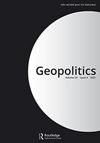Reverse Discourse, Queering of Self-Determination, and Sexual Ruptures: Abdullah Öcalan, the Kurdistan Workers Party, and the Problem of the Nation-State
IF 3.4
1区 社会学
Q1 GEOGRAPHY
引用次数: 1
Abstract
ABSTRACT The idea of self-determination through independent state formation served as a crucial political principle for groups and organisations resisting colonial domination and the capitalist world system during the post-World War II era. Kurdish political movements and parties were no exception. They embraced the idea that, as a nation, they were entitled to a state that exercised exclusive territorial control. One of these parties was the Kurdistan Workers Party (PKK), which emerged in the context of Turkey’s Kurdish issue and developed into one of the most important political actors in Kurdistan of the last 40 years. In the 2000s, the PKK started to question whether or not self-determination ought to be conceptualised and practiced through state construction. As a result, self-determination became redefined in terms of societal self-organisation, an idea beyond that of the centralised nation-state. This article shows how the PKK has shifted the concept of self-determination away from the idea of the state and towards the self-organising and self-administering capabilities of all people. This queering of self-determination has enabled a radically new understanding of resistance: the building of a post-capitalist, post-state, and post-patriarchal society.反向话语,自决的古怪和性断裂:阿卜杜拉Öcalan,库尔德斯坦工人党,和民族国家的问题
第二次世界大战后,通过建立独立的国家来实现民族自决的理念成为抵抗殖民统治和资本主义世界体系的团体和组织的重要政治原则。库尔德的政治运动和政党也不例外。他们认为,作为一个民族,他们有权拥有一个对领土行使排他性控制的国家。其中一个政党是库尔德工人党(PKK),它是在土耳其库尔德问题的背景下出现的,并发展成为过去40年来库尔德斯坦最重要的政治参与者之一。在2000年代,库尔德工人党开始质疑是否应该通过国家建设将自决概念化并付诸实践。因此,自决被重新定义为社会自我组织,一种超越中央集权民族国家的理念。这篇文章展示了库尔德工人党是如何将自决的概念从国家的概念转向所有人的自我组织和自我管理能力的。这种自我决定的古怪使人们对抵抗有了全新的理解:建立一个后资本主义、后国家和后父权社会。
本文章由计算机程序翻译,如有差异,请以英文原文为准。
求助全文
约1分钟内获得全文
求助全文
来源期刊

Geopolitics
Multiple-
CiteScore
7.60
自引率
10.30%
发文量
50
期刊介绍:
The study of geopolitics has undergone a major renaissance during the past decade. Addressing a gap in the published periodical literature, this journal seeks to explore the theoretical implications of contemporary geopolitics and geopolitical change with particular reference to territorial problems and issues of state sovereignty . Multidisciplinary in its scope, Geopolitics includes all aspects of the social sciences with particular emphasis on political geography, international relations, the territorial aspects of political science and international law. The journal seeks to maintain a healthy balance between systemic and regional analysis.
 求助内容:
求助内容: 应助结果提醒方式:
应助结果提醒方式:


